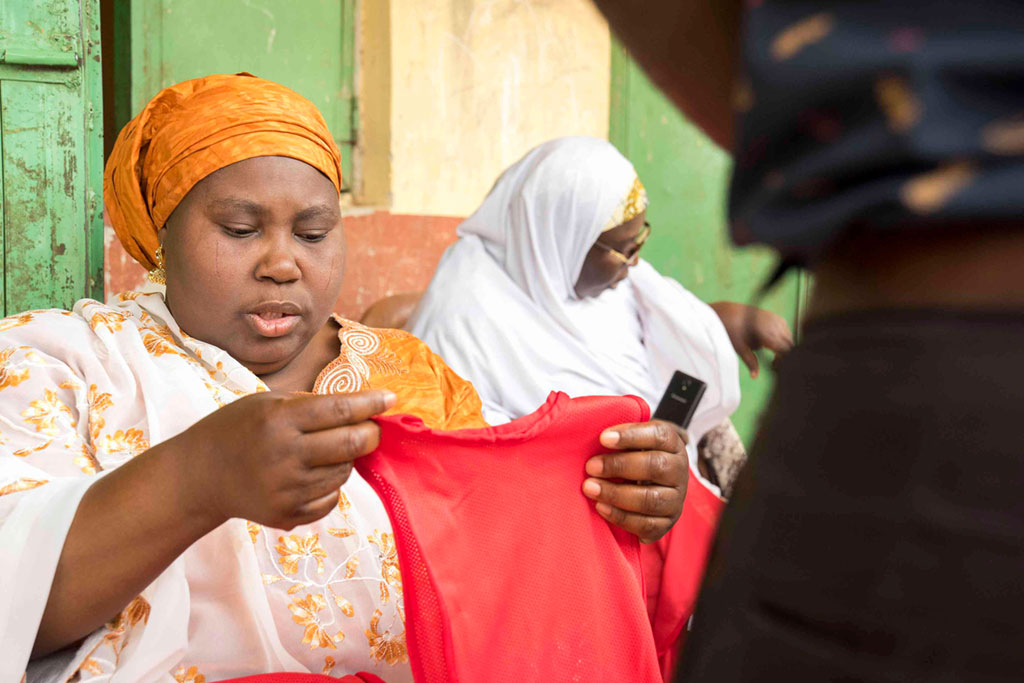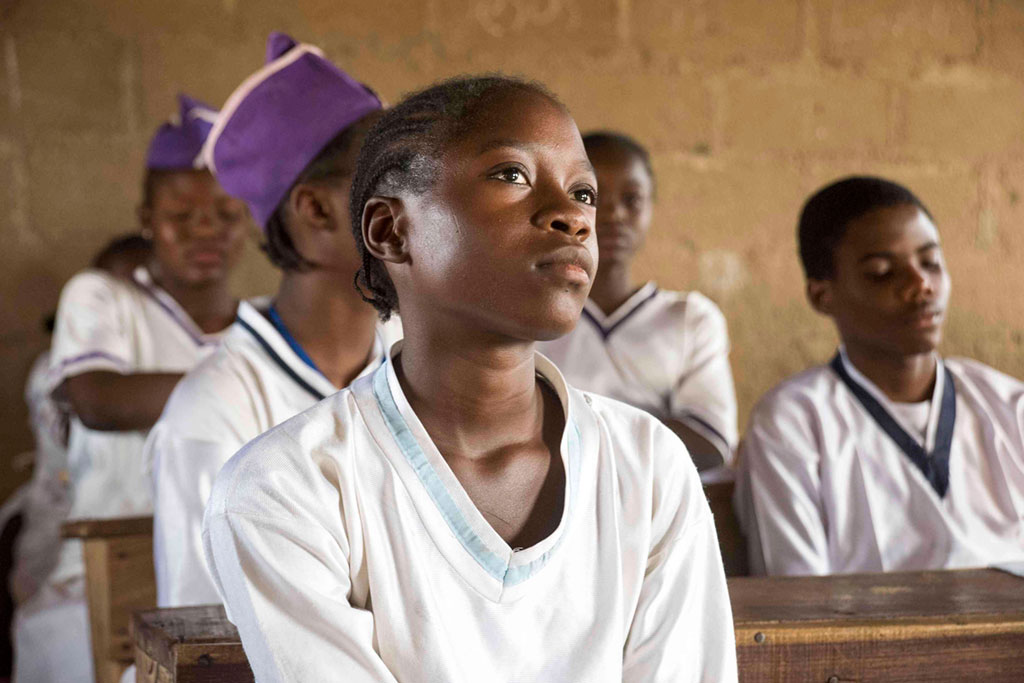Violence in Northern Nigeria has forced more than 2 million people to flee their homes—often with little more than the clothes on their backs. Only a handful of traditional camps have been established for these internally displaced persons, and instead they have sought support and even shelter in communities throughout Nigeria.
“There is a culture of philanthropy in northern Nigeria, and let me say Africa in general,” says Ayo Oladini, Program Director of the Nigeria Education Crisis Response program. “These are our brothers. And if they are brothers, then we need to help. And that’s where a lot of it starts from.”
The U.S. Agency for International Development’s Education Crisis Response program is helping to combine this local support with U.S. government funds to better serve the internally displaced school-aged children. USAID’s program is implemented by Creative Associates International, the International Rescue Committee and dozens of local organizations.
It is setting up more than 1,100 non-formal learning centers that provide educational opportunities to more than 54,000 school-aged boys and girls whose education has been disrupted as their lives have been uprooted.
Instead of viewing U.S. support as a stand-in for their own contributions, Nigerians see the assistance as inspiration to rise to the challenge.
Government organizations, religious groups, nongovernmental organizations and philanthropies are now coming forward with clothing, food, money and supplies in a way that makes the Education Crisis Response program more effective and more sustainable channel for the displaced school-aged children and youth.
“These are our brothers. And if they are brothers, then we need to help. And that’s where a lot of it starts from.” Ayo Oladini, Program Director, Nigeria Education Crisis Response program
This center belongs to us
Families who escaped Boko Haram’s violence often assumed that they could go home relatively soon.
Days, months and in some cases even years have passed. At the non-formal learning centers, they receive essential educational support—as well blankets, uniforms, chalk, school supplies and even food from Nigerian organizations that want to show their support.
Lami I. Hassam from the Christian ministry Aglow International describes spending her own money and carting four or five boxes of books and pencils back from the market, “to show our own support to these displaced children.”

The results were immediate. Children who have clothes to wear, pencils to write with and breakfast to eat are showing up eager and able to learn again.
The Federation of Muslim Women’s Association of Nigeria, which works on women and youth development in all of Nigeria’s 36 states, has consistently made education a key component of its efforts. For its members, supporting displaced children’s educational needs was a natural calling for them.
“From what we have seen, there is a great change in [the displaced children] because the support, no matter how little, [that] you happen to give them, definitely you will see the impact in them,” says Fadhimahi Usman of the Federation of Muslim Women’s Associations of Nigeria.
Representatives of the Federation met with officials and displaced people in Gombe state to find out what their needs were and started providing school supplies, clothing and food.
Seeing how much its support benefits the kids is encouraging them to keep going, and keep giving.
The Federation plans to open two skill acquisition centers in areas with a high volume of displaced women and children to provide training that could set them on a path toward reconstructing their livelihoods.
“At the end of the day, they will be able to help themselves,” says Usman. “They will be able to find something tangible for themselves.”
As non-formal learning centers funded by the program look to organizations like these for material and other support, they find that the burden of caring for and educating displaced children also reinforces their sense of ownership.
Community members are the ones approaching education agencies and Nigerian philanthropies explaining what they need and why it matters.
“They say, ‘Look, we have this center. We need this we need that,” says Oladini. “And they provide all this for them. So you see that in totality, this community, the institutions, the government…are already [putting] their minds towards saying, ‘This center belongs to us,’ and they are working all for that.”
Their efforts are paying dividends: Successful advocacy by program partners including the Federation of Muslim Women’s Association of Nigeria convinced the Emir of Gombe to provide 1,000 displaced kids with school uniforms and books. Another philanthropist in that state donated the equivalent of $212,000 to support more than 3,000 children.
Taking care of our children
At Alheri Model High School in Gombe state, children have never been turned away for not being able to pay.
Principal Henry Pundi says that sort of institutional compassion is part of the social responsibility it wants to give back. So he views USAID’s Education Crisis Response program as a vehicle to extend its reach in assisting children who need help.
The school uses its own fees to donate supplies such as books, instructional materials and pens to internally displaced children enrolled in the program, with administrators dipping into their own pockets to buy them.

At the Zion Pilgrims Christ School in Bauchi state, School Director Joel Jijingi feels a similar obligation to students who he says he wants to “make smile again.”
Jijingi and his wife set up a non-formal learning center that piggybacks on the traditional school and offers three hours of education three times a week to displaced students.
The Education Crisis Response program asked Jijingi to run a class for 50 displaced primary school students. He decided to run two classes and accommodate 100 in both primary and secondary levels for free.
“There are so many children in the community,” he says. “And our desire it that [this] is not just the work for USAID. This is not just the work for the good people of America. This is our work. They’re our children. So we should take care of them.”
Jijingi says seeing USAID’s commitment to Nigerian children made him eager to do his part.
“One of the reasons why I was motivated is because if the good people of America come all the way from America to take care of our children. That was a very big challenge to me,” says Jijingi.
“We had the resources. We have the structures on the ground. So let’s help them more.”
Why the willingness to reach a hand into an already stretched thin pocket? Jijingi has a simple answer.
“We want the community to know that we love these children,” he says.
We will continue with this project
Jijingi hopes that they can return home in due time. But when they go, he wants them to leave better educated and with the knowledge and skills they need to develop their own communities. He’s going to do whatever he can to make that possible.
That kind of personal commitment, replicated across northern Nigeria, bodes well for children who will rely on these kinds of educational opportunities after the program ends.
“We’ve always known that the support coming from the United States Agency for International Development, it’s kind of something to facilitate other support to come,” says Oladini. “It’s something that is very important and without which the sustainability we’re talking about and the ownership which we are talking about can never be achieved.”
When Nigerians commit to supporting these children’s futures however they can, the goal of sustainability appears attainable despite the ever-present challenges.
“When the good people of American have withdrawn,” says Jijingi, “we will continue with this project until the last child has the basic understanding, basic knowledge of education, so that he can be useful in his community.”
Reported from Nigeria by Michael. Zamba.
